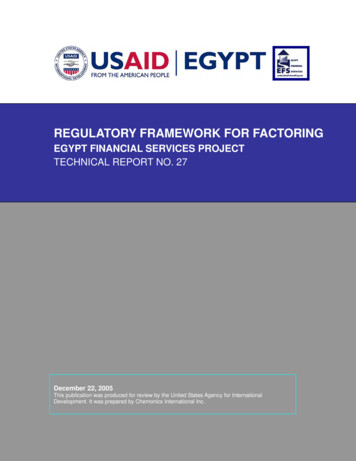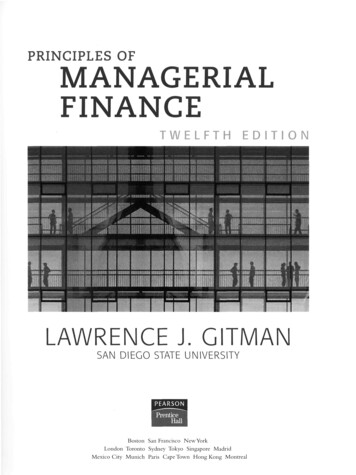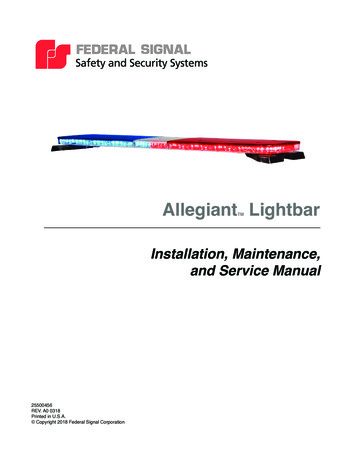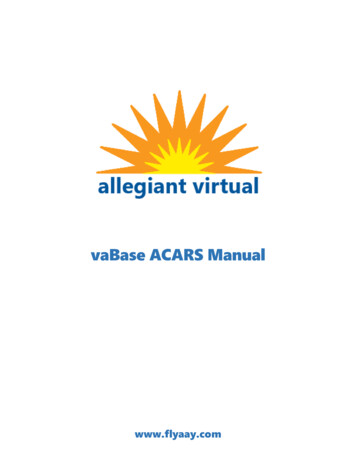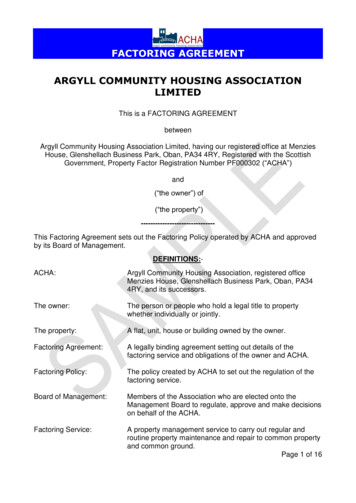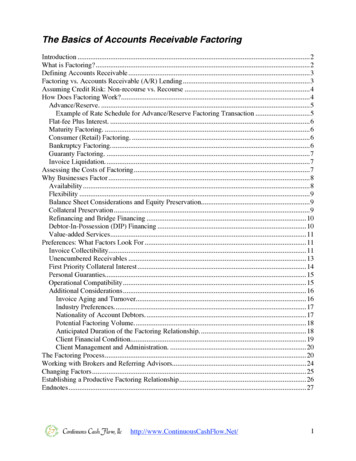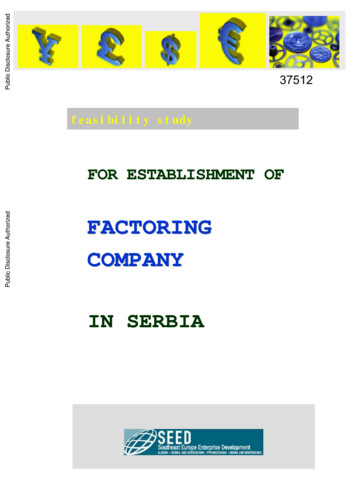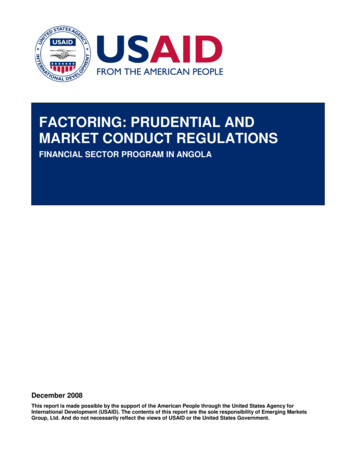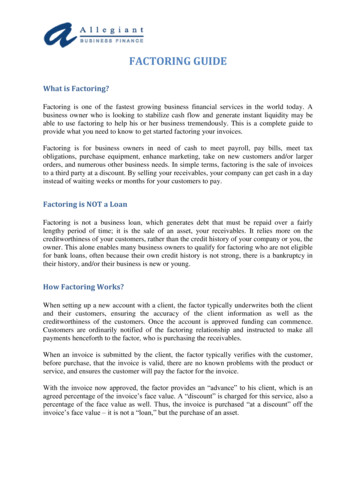
Transcription
FACTORING GUIDEWhat is Factoring?Factoring is one of the fastest growing business financial services in the world today. Abusiness owner who is looking to stabilize cash flow and generate instant liquidity may beable to use factoring to help his or her business tremendously. This is a complete guide toprovide what you need to know to get started factoring your invoices.Factoring is for business owners in need of cash to meet payroll, pay bills, meet taxobligations, purchase equipment, enhance marketing, take on new customers and/or largerorders, and numerous other business needs. In simple terms, factoring is the sale of invoicesto a third party at a discount. By selling your receivables, your company can get cash in a dayinstead of waiting weeks or months for your customers to pay.Factoring is NOT a LoanFactoring is not a business loan, which generates debt that must be repaid over a fairlylengthy period of time; it is the sale of an asset, your receivables. It relies more on thecreditworthiness of your customers, rather than the credit history of your company or you, theowner. This alone enables many business owners to qualify for factoring who are not eligiblefor bank loans, often because their own credit history is not strong, there is a bankruptcy intheir history, and/or their business is new or young.How Factoring Works?When setting up a new account with a client, the factor typically underwrites both the clientand their customers, ensuring the accuracy of the client information as well as thecreditworthiness of the customers. Once the account is approved funding can commence.Customers are ordinarily notified of the factoring relationship and instructed to make allpayments henceforth to the factor, who is purchasing the receivables.When an invoice is submitted by the client, the factor typically verifies with the customer,before purchase, that the invoice is valid, there are no known problems with the product orservice, and ensures the customer will pay the factor for the invoice.With the invoice now approved, the factor provides an “advance” to his client, which is anagreed percentage of the invoice’s face value. A “discount” is charged for this service, also apercentage of the face value as well. Thus, the invoice is purchased “at a discount” off theinvoice’s face value – it is not a “loan,” but the purchase of an asset.
Factoring Has Many BenefitsThe client now has cash to meet payroll, pay bills, or whatever his/her needs may be. Thefactor now waits for the invoice to be paid by his client’s customer. Often the discountpercentage increases with the passage of time, so the longer an invoice takes to pay, thehigher the discount. The incremental increases can be any length of time: daily, weekly, 30days, 60 or even sometimes 90 every arrangement may be different.The factor tracks the receivables, and when payment is received, keeps the amount advancedplus the discount earned, and then pays the client a “rebate” for the difference remaining. Thecycle can then repeat itself as often as the client wishes.Advantages of FactoringBusinesses which are experiencing rapid growth and need to purchase materials, pay vendorsand cover operating expenses can benefit from factoring. Here are a few of the benefits tofactoring: You can obtain immediate cash for any business use without creating debt on your balancesheet.No need to give up equity.You can expand your business and take on more and/or larger accounts.Your “credit line” grows with your business.If you need to meet payroll consistently and without worry, factoring can relieve you of a lotof stress.Even startup businesses with no financial track record can quickly generate cash.Factoring can provide needed capital for businesses who experience seasonal or sporadicslowdowns.If you need to make tax payments, factoring can provide the cash to make this possible.Because of your improved cash flow, you may qualify for better terms and/or discounts forearly payments with your suppliers.Receive free credit analysis on your customers and make more informed financial decisions.Pay no up front factoring fees or monthly payments.Work with an in-house Account Executive. Factoring companies provide you with a high levelof personal care and customer service. Let the experts do what they do best!By having immediate cash, your company can take early payment discounts, pay bills, payrolland taxes, and use the funds in a variety of other ways to increase profit margins. It’s as if allyour customers were on C.O.D. without the accompanying limitations.Free monthly accounts receivable reporting.Fund new marketing campaigns.Approval and funding within 24 hours.
Types of FactoringIn general, there are a various types of factoring services available, and not all factoringcompanies provide each of these services.Recourse Factoring:This is the most common type of factoring. Here, if your customer does not pay your factoredinvoices for any reason (typically within a “recourse period,” for example 90 days), you areresponsible to make the factor whole. That is, you must (through any of various means) repay thefactor for the advance you received plus the factoring discount owed on date of the “chargeback.”There is no debt protection under this type of service, and you must be sure to factor invoices onlyto customers who will dependably pay your invoices.Most often these repayments are made from rebates you are owed, other reserves the factormay keep for your account, from new invoices you provide to replace the unpaid ones, and/orwith simple cash payments.Non-Recourse Factoring:If your customer does not pay due to insolvency or bankruptcy – in other words, yourcustomer can’t pay your invoices – the factor does not need to be made whole by you, sinceyou are factoring “without recourse.” The factor simply absorbs the loss.However, if there is a dispute or dissatisfaction with the product or service you provided – thecustomer won’t pay – you are still obligated to make factor whole, even if you factor withoutrecourse. There is recourse with a non-recourse factor in this type of situation.A factor who provides non-recourse factoring may obtain insurance on the receivablespurchased, and your customers are underwritten with more stringent requirements to beapproved. As a result, some of your customers who may be accepted for recourse factoringcould be declined for non-recourse factoring.Non-Notification Factoring:With this method, your customer is not notified of the arrangement between you and thefactor. Because more work is involved for the factor to keep the relationship confidential, anon-notification relationship commonly costs more than full notification factoring.While some companies using a factor for the first time may think they’d prefer to factor on anon-notification basis, many find that it is not really necessary as most of their customersalready are familiar with the practice and don’t care whether their invoices are factored ornot.
Invoice Discounting:With invoice discounting, you do not sell your invoices but rather use them as collateral for aloan, usually in bulk (using all your receivables, rather than selected invoices and/orcustomers). Typically, an agreed percent of your invoices’ face value is provided, and as yourinvoices are repaid by your customers, the factor providing the invoice discounting is repaid.The agreement is ordinarily confidential, as with non-notification factoring.Maturity FactoringHere, the factor takes over all credit and collection functions and ordinarily providesreceivables insurance to the business owner. However, the advance is not provided until thedate the invoices are due to be paid, or shortly thereafter. Payment to the seller may be doneon a monthly basis, on the average due date of the invoices factored. In some cases the factormay grant the client’s customer an extension of payment terms (later than the Net terms),who is charged for this if accepted. This type of factoring is not commonly practiced, thoughsome factors provide it.Who Can Qualify?Allegiant is much more concerned with the credit worthiness of your customers than withyour current financial condition. If you have commercial customers and fit into one of thefollowing categories, then factoring could be a great solution for you: A business that is highly seasonalAn organization that is experiencing high growthA Start-up entity or one that has been in business for a short timeAcquisition/buyout transactionsTax Liens (assuming the IRS will subordinateA company emerging from bankruptcyUnable to meet current loan or net worth financial ratiosLoan workoutsInsufficient collateralAnd MANY more!Who Needs Factoring?Any business that provides a product or service to creditworthy businesses or governmentcustomers can benefit from factoring.Here are just a few industries that regularly profit from factoring: ManufacturersWholesalersDistributorsService providers of all types, including janitorial and cleaning companies
Staffing agenciesSecurity Guard servicesTrucking companiesTechnologyCourier servicesConsultingPrivate investigatorsOilfield servicesIT consultantsLandscapingFood service (commercial)AdvertisingAnd MANY more!Factoring Process
1. The prospective client completes an application and submits it to Allegiant with acopy of its accounts receivable aging schedule.2. Allegiant gives preliminary approval and quotes terms subject to formal duediligence.3. After the prospective client accepts the terms, Allegiant completes a formal creditreview of client, client’s customers, and the principal’s personal credit.4. Assuming both Allegiant and the client wish to proceed, client executes and sendsAllegiant a Purchase and Sales Agreement with an Assignment and NotificationLetter.5. Allegiant executes Purchase and Sale Agreement thus purchasing the accountsreceivable and advances the client up to 90% of the value of the invoices.6. Your customers are notified of the new payment address.7. When Allegiant collects the payment of the invoices, the balance of the invoice,called the reserves, less the factoring fee is remitted back to the client.8. Allegiant provides you with regular statements of activity on the accounts. Futureinvoices are purchased within 24 hours of Allegiant receiving the invoices from theclient.9. We have 24/7 online access to multiple credit resources and databases. We use thesesources to assist with reviewing and establishing credit limits for your client base.10. Your dedicated Account Executive will work with your company by providingassistance with collection calls, invoice mailing and follow up, payment processingand credit monitoring.11. With our 24/7 online access to your account with Allegiant Business Finance, you cango online and monitor your factored invoices and balances anytime you like. You canalso set up online access for whomever you designate at your company. You willnever be out of touch with your accounts receivable!Call us at (866) 377-0800 to get the cash you need todayby FACTORING with Allegiant Business Finance.
7. When Allegiant collects the payment of the invoices, the balance of the invoice, called the reserves, less the factoring fee is remitted back to the client. 8. Allegiant provides you with regular statements of activity on the accounts. Future invoices are purchased within 24 hours of Alle



